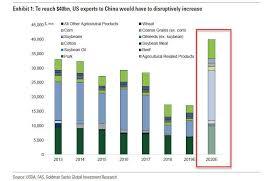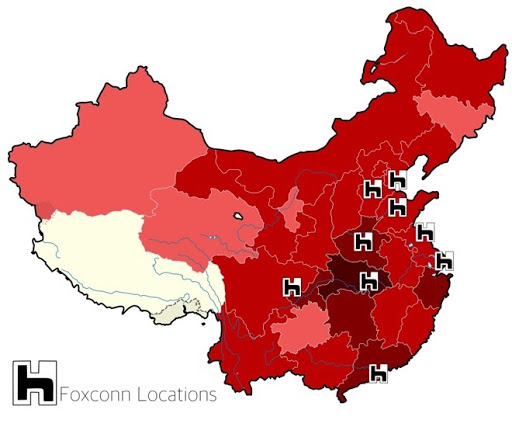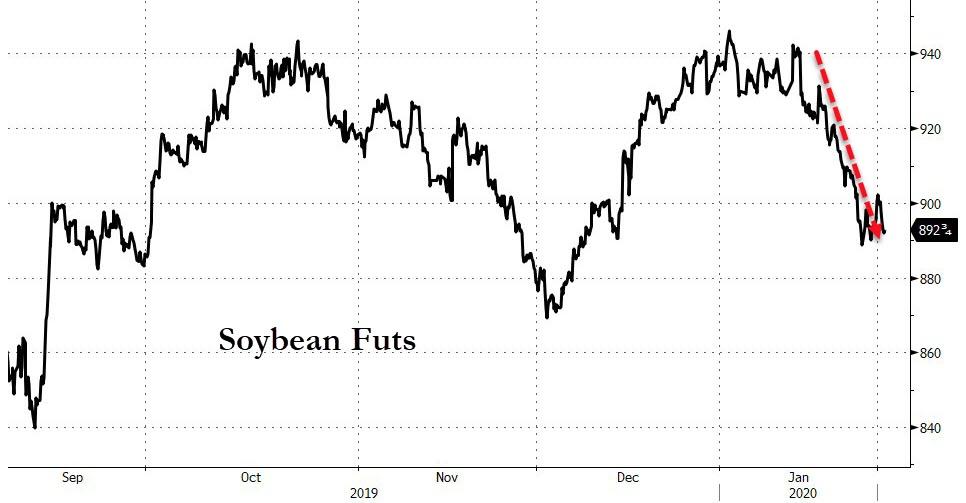Coronavirus Could Hinder Beijing's Ability To Fulfill Phase One Trade Deal
China's next dilemma will be fulfilling the phase one trade deal, which states they must buy $200 billion in additional products from the U.S. over two years on top of pre-trade war levels, reported the South China Morning Post (SCMP).
The outbreak of the deadly virus has dramatically slowed China's economy, with nearly 57 million people in 15 cities on lockdown for the next several weeks. Factories and transportation networks across much of the country are shut down, which means goods across domestic and international supply chains are not free-flowing in the country.
Cases of the deadly virus continue to exponentially rise, as government numbers on Tuesday night show more than 6,000 infected and 132 confirmed deaths. Comparing the deadly virus with the 2003 SARS outbreak – it's important to note that coronavirus has already surpassed the number of infected by SARS in a few weeks, compared to the nine-month ordeal almost two decades ago.
Traders who spoke with SCMP had their doubts that China could hit hard targets of an additional $32 billion agriculture and $52 billion energy pledge over the next two years, mostly because the demand for the goods has collapsed. Also, countries like Brazil and Argentina have eroded U.S. market share in China over the last year with cheaper products.
"There are some cities and villages essentially in lockdown, and this will completely hamper the movements of not only people, but also agricultural goods. So hogs that are supposed to be going to the slaughterhouse, will just not be transported," said Andrei Agapi, associate pricing director for agriculture at S&P Global Platts in Singapore.
Large swaths of the country's industrial complex have been shut down, expected to last for the next several weeks. Currently, there's no cure, and the spread of the virus is becoming uncontrollable, this could lead to extended shutdowns.
We noted Monday, Foxconn has a large manufacturing plant making Apple’s iPhones in Wuhan, the epicenter of the virus outbreak, along with other facilities nearby, are currently closed until February 10.
Besides major industrial hubs closed, critical transportation networks across China remain closed, which has impeded the ability of goods to move freely across the country.
"The viral outbreak definitely throws a wrench into those [purchasing] plans, not just in terms of logistics – as major ports and transport links are closed or disrupted – but also in [terms of] policymaker attention," said Nick Marro, global trade lead at The Economist Intelligence Unit in Hong Kong.
Marro said the country is occupied with "mobilizing most of its resources to handle the outbreak, which is now the top item on the policy agenda. The trade war with the U.S. inevitably has to come second."
Agapi said private buyers who want to hedge their import purchases in the futures market might not be able to do so until February 3, when markets open.
"Anybody that wants to buy soybeans will not be able to hedge their crush margins on the futures exchange, and that will be an additional reason why people will just hold off on their buying," Agapi said. "Some people are also not going to be able to come to work depending on the restrictions on travel. So in practical terms, I think that is going to lower the buying base."
Carlos Casanova, an Asia-Pacific economist at Coface, said the impact of the economy coming to a halt will be felt on the largest companies with “supply chain exposures to Wuhan and other cities that are locked down. As no merchandise will be leaving soon, we anticipate some degree of disruption and payment delays."
Renaud Anjoran, CEO of China-focused trade and manufacturing advisory firm Sofeast, said travel bans in the country could lead to a more pronounced industrial slump, where factories could be idled for an extended period that would create further problems with the ability of some companies to purchase U.S. goods.
Coronavirus is China's new excuse for why they couldn't meet hard targets in phase one trade deal.
https://ift.tt/2RYBccU
from ZeroHedge News https://ift.tt/2RYBccU
via IFTTT







0 comments
Post a Comment